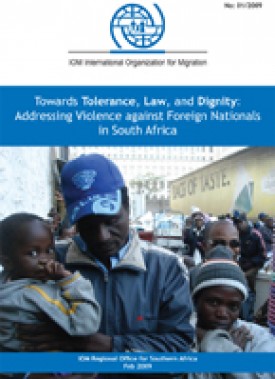Towards Tolerance, Law, and Dignity: Addressing Violence against Foreign Nationals in South Africa
Resource type: Research Report
International Organization for Migration |
This report, funded by The Atlantic Philanthropies, presents research conducted for the International Organization for Migration (IOM) by the Forced Migration Studies Programme at the University of the Witwatersrand and funded by the UK Department for International Development (DFID).
The Forced Migration Studies Programme at the University of the Witwatersrand is an Atlantic grantee.
by Jean Pierre Misago with Loren B. Landau and Tamlyn Monson
Johannesburg, February 2009
Executive Summary
Although violence against foreign nationals and other ‘outsiders’ has been a long-standing feature of post-Apartheid South Africa, the intensity and scale of the May 2008 attacks were extraordinary. What started off as an isolated incidence of anti-foreigner violence in Alexandra on 11 May, quickly spread to other townships and informal settlements across the country. After two weeks and the deployment of the Army, the violence subsided. In its wake, 62 people, including 21 South Africans, were dead; at least 670 wounded; dozens of women raped; and at least 100 000 persons displaced and property worth of millions of Rand looted, destroyed or seized by local residents and leaders.
The attacks stimulated a range of pronouncements and accounts from political and community leaders, scholars, media and civil society. There was also a proliferation of explanations regarding the root and immediate causes, as well as appropriate strategies for short, medium and long-term interventions. However, many of the earlier recommendations were premised on outdated or inaccurate information, and if implemented, could be ineffective or potentially exacerbate xenophobia and related violence.
Recognising the need for an objective, politically neutral account of the attacks, this report presents the findings of a baseline study commissioned by IOM and conducted by the Forced Migration Studies Programme (FMSP) at Wits University in Johannesburg. Funded by the UK’s Department for International Development and involving almost five months of field work in seven sites in Gauteng, and the Western Cape, its main objective was to move beyond much of the existing work that focused largely on attitudes and perceptions. Instead, this study outlines the political economy of violence against outsiders and the immediate triggers and factors that helped translate xenophobic attitudes into the violent attacks witnessed in May 2008. These same triggers and incentives account for much of the violence that preceded May 2008. If not adequately addressed, they could result in future violence against both foreign nationals and South African citizens.
Primary Findings and Conclusions
There are broad structural and historical factors that led to the May 2008 violence including the legacy of institutional discrimination and generalised mistrust among citizens, police, and the elected leaders. But these cannot explain the location and timing of the attacks. Similarly, this study finds little evidence to support early accounts blaming the eruption of the violence on a ‘third force’, poor border control, changes in national political leadership, or rising food and commodity prices. These factors may have contributed to generalised tensions, but they cannot explain why violence occurred in some places and not others.
In explaining the timing and location of violence, this study’s findings are that in almost all cases where violence occurred, it was organised and led by local groups and individuals in an effort to claim or consolidate the authority and power needed to further their political and economic interests. It therefore finds that most violence against non-nationals and other ‘outsiders’ which occurred in May 2008 is rooted in the micro-politics of the country’s townships and informal settlements. By comparing affected and non-affected areas, this report shows that only a trusted, competent and committed leadership (from grassroots to high-level officialdom) can make a significant difference in terms of preventing social tensions from turning into xenophobic violence.
Beyond these broad conclusions, the research identifies a number of common factors that fostered violence in those places where it occurred.
These include:
- Institutionalised practices that exclude foreigners from political participation and justice; Often premised on limited knowledge of and respect for the country’s laws and policies, these practices continue to criminalise and villanise foreign nationals and other ‘outsiders’;
- A lack of trusted, prompt and effective conflict resolution mechanisms that leads to vigilantism and mob justice;
- Political vacuums or competition in community leadership that encourages the emergence of unofficial, illegitimate and often violent forms of local leadership that enhance their authority and power by reinforcing communities’ resentment towards what is perceived as ‘non-compliant’ foreign nationals;
- A culture of impunity with regard to public violence in general and xenophobic violence in particular that encourages the ill-intentioned to attack non-nationals and other outsiders for personal and/or political gain.
In responding to the threats and outbreaks of violence, the study finds that local leaders and police were typically reluctant to intervene on behalf of victims. In some cases, this was because they supported the community’s hostile attitudes towards foreign nationals. In others, they feared losing legitimacy and political positions if they were seen as defending unpopular groups. In almost all instances, local leaders and police spoke of their incapacity to counter violence and violent tendencies within their communities.
While many non-nationals who fled in fear of the violence have returned to their communities, the study finds that return and reintegration is either undesirable or impossible where foreign nationals’ property has been appropriated by local residents and leaders or where community leaders were actively involved in the violence. The study did not identify any local or national government initiative dedicated to preparing potentially hostile communities for the return or reintegration of displaced non-nationals. Nor did it uncover any systematic effort to hold accountable those responsible for the violence.
